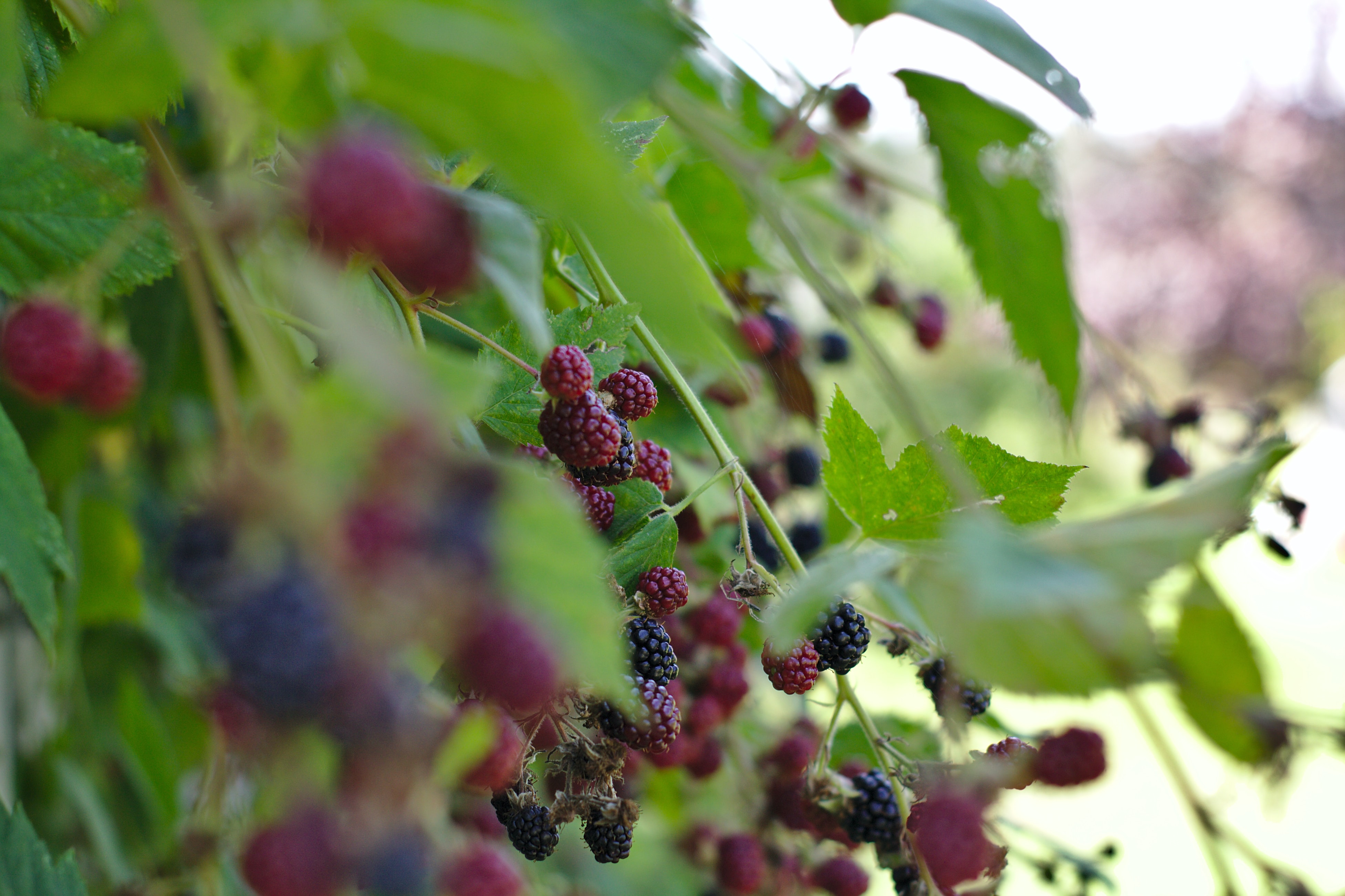A Lesson from the Blackberry Patch
For as long as I can remember my family has loved blackberry pie. It was a favorite of my grandfather, who was born in 1879 and lived to be 95. It is the wild blackberries that we like. The tame ones are not as good.
The last few years it has been hard to find wild blackberries. With all the construction, many vines have been cut down, and the crops have not been good for some time. This year, though, I found an excellent blackberry patch and the crop was abundant. I picked a couple of gallons of blackberries and have made four cobblers and given my mother and sister enough to make three or four pies.
Last Friday, July 23, I went back to my patch to see if I could pick more berries. There is an adjacent patch that is loaded, but it is inaccessible without something to climb with and something to cut back the briars with. So I went to the patch I had been picking from. Someone had come behind me and picked just about all the berries that I had not picked before when they were not yet ripe. I went through the patch and found a few berries, so I kept picking. I would find a few here and a few there. I had to keep looking and searching around, but I kept finding a few. In the midst of this picking effort, it occurred to me that I was gleaning. I remember saying to myself, “I’m gleaning.” The full harvest was over. The time when I could go into the patch and pick handfuls at every turn had passed. Now I had to look harder and reaped less. Finally, though, I got enough berries to make the last cobbler of 2004.
When I realized that I was gleaning, I thought of Ruth in the Bible. Ruth was a Moabite, a woman from a people who had been outlawed from the assembly of God’s people (Dt. 23.3-4). She was what we would call a lost person today. We have all known that condition, haven’t we? We all were Moabites, outcast from the people of God. But let’s read Ruth 2.1-17 and see what took place.
“And Naomi had a kinsman of her husband’s, a mighty man of wealth, of the family of Elimelech, and his name was Boaz. 2 And Ruth the Moabitess said to Naomi, ‘Let me now go to the field and glean among the ears of grain after him in whose sight I may find favor.’ And she said to her, ‘Go, my daughter.’ 3 And she left and went and gleaned in the field after the reapers, and she happened to come to the portion of the field belonging to Boaz, who was of the family of Elimelech. 4And, look, Boaz came from Bethlehem and said to the reapers, “I AM be with you.” And they answered him, “I AM bless you.” 5Then Boaz said to his servant who was over the reapers, ‘Whose young woman is this?’ 6 And the servant who was over the reapers answered and said, ‘It is the young Moabite woman who came back with Naomi from the country of Moab. 7And she said, “Let me glean please and gather after the reapers among the sheaves.” So she came, and has continued from the morning until now, except that she rested in the house a little while.’
8“Then Boaz said to Ruth, ‘Listen, my daughter? Don’t go to glean in another field or go from here, but stay here with my servant girls 9 Let your eyes be on the field that they reap and go after them. I have charged the young men not to touch you. And when you are thirsty go to the vessels and drink of that which the young men have drawn.’ 10 Then she fell on her face and bowed herself to the ground and said to him, ‘Why have I found favor in your sight, that you should take notice of me since I am a foreigner?’ 11 And Boaz answered and said to her, ‘It has been fully reported to me all that you have done for your mother-in-law since the death of your husband, and how you have left your father and your mother and the land of your birth, and have come to a people that you did not know before. 12 I AM recompense your work, and a full reward be given you by I AM, the God of Israel, under whose wings you have come to take refuge.’ 13 Then she said, ‘Let me find favor in your sight, my lord, that you have comforted me, and that you have spoken kindly to your maidservant, though I am not like one of your maidservants.’
14“And at meal time Boaz said to her, ‘Come and eat of the bread and dip your piece of bread in the vinegar.’ And she sat beside the reapers and he passed her parched grain and she ate and had enough and left some. 15And when she had risen up to glean, Boaz commanded his young men saying, ‘Let her glean even among the sheaves and don’t reproach her. 16 And also pull out some for her from the bundles and leave it, and let her glean and don’t rebuke her.’ 17 So she gleaned in the field until evening, and she beat out that which she had gleaned, and it was about an ephah of barley.”
The first verses tell us that Naomi had a kinsman named Boaz and that Ruth wanted to go out to the fields and glean after the reapers. Gleaning was done by the poor. The law of Israel required that when those who owned fields harvested them, they must leave some of the grain behind for the poor to pick up. So here was Ruth among the poor, gleaning, trying to get enough grain to get by. She just “happened” to be in Boaz’ field.
Boaz came to the field where Ruth was gleaning and noticed her. He asked about her and was told her story. Then he spoke to her and told her not to leave his fields to glean in any other and told her to drink water from the water which his servants drew. When Ruth asked the reason for his kindness, he told her that he had been told what she had done with regard to Naomi, and he said, “May I AM reward your work, and your wages be full from I AM, the God of Israel, under whose wings you have come to seek refuge.” Notice two statements here. One, Boaz told her to drink water when she was thirsty. Now water in the Bible is a symbol of the Holy Spirit, and the Lord Jesus said in Jn. 7 that whoever had faith in him would have rivers of living water flowing from within. We would say that Ruth had been born again and had the Holy Spirit living in her. Second, Boaz confirms this thought by saying that Ruth had sought refuge under the wings of the God of Israel. So she has moved from being a lost Moabite to being one of the people of God. We have all made that step, haven’t we? We have tasted the waters of the Holy Spirit as we have experienced new birth and come under the refuge of the wings of God.
But there is a problem. She is one of the people of God, but she is gleaning with the poor, trying to pick up enough to get by. God does not want his people gleaning, just doing the best they can. So notice that Boaz called her to come eat lunch with the reapers. He gave her food she had not harvested. He fed her a meal. Have we not all had the experience of being fed a meal by the Lord Jesus? We were poor. All we could do to make a spiritual living was to rely on the mercy of the rich landowners. We would get a few morsels from a great preacher or a good book. Then the Lord Jesus called us to his table and gave us a meal. Food we did not even harvest. That is grace. And Ruth was satisfied and even had some left over, which she took home to Naomi (v. 18).
Then we come to chapter 3, where Ruth spends the night at the feet of Boaz. In the morning she explains to him that he is Naomi’s redeemer, the one who can buy back the inheritance that Elimilech sold when he was about to leave Israel. Boaz tells her that there is one who has the first right to redeem, but if he would not, then Boaz would redeem the land. Then he had Ruth drape her outer garment over her hands and arms and measured six measures of grain into the garment. Ruth closed the cloak around the grain and took it home to Naomi. So we see that Boaz gave her water, gave her a meal, and now gives her six measures of grain that she did not harvest herself. That is grace. Have we not all experienced such grace? We are still among the poor, gleaning. But then I AM inexplicably gives us an abundant gift. He gives more than we need for now and we have a supply to take with us.
Then Boaz went to the city gate where business was conducted and called several of the elders of the city to come be witnesses. When the man who had the right to redeem Naomi’s land came by, Boaz stopped him and told him about Naomi’s land and that he had the first right to redeem it. The man said he would redeem it. Boaz then explained that if he redeemed the land, he had to marry Ruth also, so as to have a child by her and thus continue the name of Ruth’s deceased husband in Israel. Then the man said that he could not redeem the land. He could not marry Ruth. Then Boaz said that he would redeem the inheritance and marry Ruth, which he did. See where we are now. Ruth has come from being an outcast Moabite to being a poor gleaner in the fields of Boaz, to being given water and fed a meal and being given a large measure of grain, to being the wife of the one who owned everything and eating at his table from his abundance. I tell you, I AM does not want his people gleaning, getting by the best they can. He wants his people eating at the table of the King. And he wants them married to the King.
And we have all known something of this blessed experience, haven’t we, eating at the King’s table? Ps. 78.19 has the doubting question, “Can God prepare a table in the wilderness?” Those who asked the question thought the answer was no, but they learned it was yes and we know it was yes. It still is yes. We live in a desert. This world is a desert to God’s people. There is nothing here of eternal value to us. We must be fed from Heaven. And God feeds us, doesn’t he?
But there is another table referred to by the Lord Jesus in Mk. 14.25, “Amen I say to you, I will never again drink of the fruit of the vine until that day when I drink it new in the kingdom of God.” We learn in Rev. 19 that that table is the banquet table for the marriage supper of the Lamb. We are not yet married to I AM, but we are betrothed to him. He feeds us manna in the wilderness now, but oh what a feast there is waiting for us when we become the wife of our heavenly Boaz, the Lamb, our Redeemer, and celebrate the marriage in the kingdom of God and see him as he drinks the fruit of the vine with the bride for whom he gave his life. We will never again glean with the poor, but will feast forever at the table of the King.
I challenge each one of you: Are you gleaning with the poor, just getting by, or are you feasting at the table of the King? God does not want any of you to glean, but to enjoy the full harvest of grace.
And that is the lesson from the blackberry patch.
These thoughts were shared at the Church in Ed and Marian’s house on Sunday, July 25, 2004.
Old Testament Scripture is my update of the American Standard Version.
Copyright © 2004 by Tom Adcox. All rights reserved.




